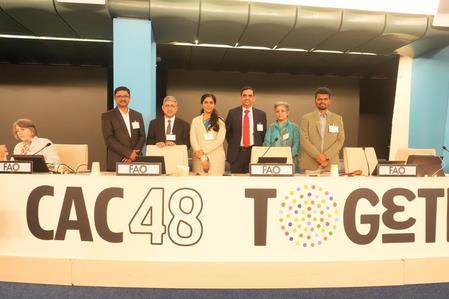
India Re-Elected To Codex Executive Committee, Reaffirms Collaborative Global Food Governance
The Codex Alimentarius Commission (Codex) is the international food standards setting body established by the United Nations' Food and Agriculture Organization (FAO) and the World Health Organization (WHO).
India concluded a productive session at the 48th Codex Alimentarius Commission (CAC48), securing a unanimous mandate that highlights its commitment to collaborative global food governance, focusing on efficiency, data management, and the development of equitable standards.
The Indian delegation, led by Rajit Punhani, Chief Executive Officer of the Food Safety and Standards Authority of India (FSSAI), alongside representatives from the Ministry of Health and Family Welfare and technical expert organisations, achieved several key strategic outcomes.
“Earlier in the week, during the CCEXEC89 session, India, as Member Asia, strongly contributed to discussions on Codex efficiency and future challenges,” according to the Health Ministry.
The country particularly emphasised the focus on updating and developing databases on food additives, pesticide residues, veterinary drugs, methods of analysis, and contaminants in food.
India also supported the use of modern technologies, including Artificial Intelligence (AI), to improve the efficiency of Codex operations, particularly in relation to document translation.
The delegation was active in defending national and regional interests, highlighting the necessity to consider regional data when developing standards. India played a critical role in advancing several global standards, ensuring their relevance and utility for the region.
A major achievement for agricultural trade was securing the advancement of the Standard for Cashew Kernels. India successfully advocated for the resumption of this work, and CAC48 recommended issuing a Circular Letter to collect comments, preparing the proposal for review by CCEXEC90 and subsequent consideration at CAC49.
Demonstrating regional influence, India supported converting the regional standard for laver products (Asia) into a worldwide standard and welcomed the new work on a commodity standard for pasteurized liquid camel milk, said the ministry.
The session concluded with India's renewed commitment to working within the multilateral system to foster food safety, quality, and fair trade for all members.

Legal Disclaimer:
MENAFN provides the
information “as is” without warranty of any kind. We do not accept
any responsibility or liability for the accuracy, content, images,
videos, licenses, completeness, legality, or reliability of the information
contained in this article. If you have any complaints or copyright
issues related to this article, kindly contact the provider above.

















Comments
No comment